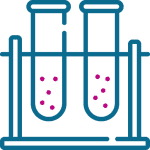Automated haematological blood test (with reticulocytes)
A CBC is a selective automated blood test that provides information on all blood cells (erythrocytes, leucocytes, platelets) and the size distribution of cells.
11,00 €

What is the need for a study?
An automated haematological blood test (with reticulocytes) is a selective automated blood test that provides information on all blood cells (erythrocytes, leucocytes, platelets) and the size distribution of cells. The test helps to screen for many different diseases: anaemias, infections, inflammatory diseases, nutritional status, bleeding.
When should I be tested?
It is usually given as a first health screening test and is the main starting point for further, more accurate tests. It is recommended to have a BKT test not only as a preventive measure, but also for any ailment. The test helps diagnose and monitor a wide range of conditions. It is recommended if you feel tired or weak, or if you have an infection, inflammation, bruising or unusual bleeding.
What sample is needed for the test?
Blood is drawn from a vein in the arm. It can be taken from the tip of the toe in children and from the heel in newborns.
How to prepare for the survey?
No need.
What do my results mean?
Automated haematological blood test (with reticulocytes) – the results are assessed in a comprehensive manner, taking into account all the parameters measured, the person’s complaints and other clinical features. It is always recommended that you discuss the results with your doctor.
Changes in individual parameters:
1. Leucocyte count – increases in infections, inflammation, cancer, leukaemias, and decreases in autoimmune diseases, viral infections, severe infections, bone marrow failure, spleen enlargement, liver disease or alcohol consumption, and some medicines.
2. Neutrophils are a dynamic population of leukocytes. The number (proportion) of these varies from day to day, depending on what is happening in the body. They are among the first cells to fight a bacterial infection.
3. Lymphocytes – a population of leucocytes that may increase or decrease in number (proportion) due to viral infections, and increases in chronic lymphocytic leukaemia.
4. Monocytes – a population of leukocytes that can increase in number (proportion) in some infections (e.g. tuberculosis) or bone marrow damage.
5. Eosinophils – a population of leukocytes that may increase in number (proportion) in asthma, hay fever, eczema, drug allergies, some parasitic infections and other diseases such as vasculitis, Hodgkin’s lymphoma and bone marrow damage
6. Basophils – a population of leukocytes that can increase in number (proportion) in certain infections, inflammatory diseases or bone marrow damage, such as chronic myeloid leukaemia.
7. Erythrocytes, haemoglobin and haematocrit – numbers decrease in cases of anaemia, and increase due to overproduction of erythrocytes or fluid loss (diarrhoea, lack of fluid intake, burns).
8. MCV – increases in cases of vitamin B12 and folic acid deficiencies, liver disease, pregnancy, alcohol abuse, thyroid problems and bone marrow damage. Decreases in the case of iron deficiency anaemia or prolonged inflammatory disease.
9. MCH – reduced in cases of iron deficiency, inflammatory diseases or thalassaemia.
10. MCHC – helps to interpret MCH results.
11. RDW – an increase in RDW indicates an abnormal size distribution of erythrocytes, which may be due to a deficiency of iron, vitamin B12, or folic acid, or to a bone marrow disorder.
12. Platelets – elevated numbers occur after bleeding, inflammation, infections and surgery, in bone marrow disorders, and in people with a removed spleen or impaired spleen function. Decreased numbers are linked to immune diseases, vitamin deficiencies, some medications, alcoholism, liver disease, enlargement of the spleen, bone marrow disorders, and some rare inherited disorders.
13. MPV – varies with platelet production, with higher MPV for young platelets and lower MPV for old ones.
Related studies
BST, blood cytomorphology test
Related conditions/diseases.
Infections, inflammatory and immune diseases, anaemias, vitamin B12 deficiency, folic acid deficiency, bone marrow damage
You can consult our family doctors.
Article source.
